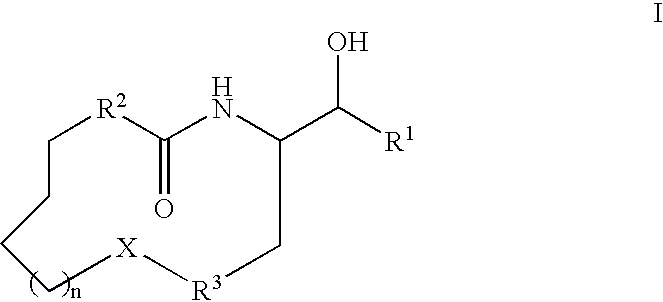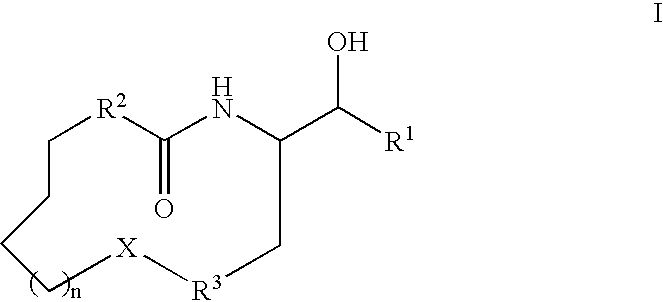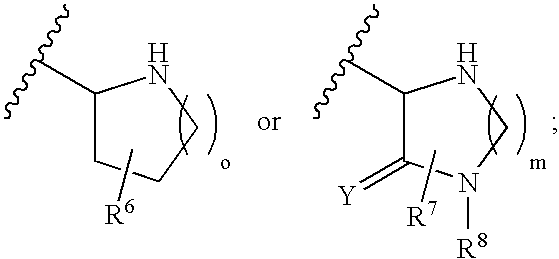Macrocyclic beta-secretase inhibitors
a macrocyclic bace1 inhibitor and beta-secretase technology, applied in the direction of heterocyclic compound active ingredients, biocide, drug compositions, etc., can solve the problem of not preventing disease progression
- Summary
- Abstract
- Description
- Claims
- Application Information
AI Technical Summary
Benefits of technology
Problems solved by technology
Method used
Image
Examples
example 1
PREPARATIVE EXAMPLE 1
[0214]
Step 1
[0215] To 4-chloro-1-butanol (49.5 g, 0.456 mmol) in an ice-water bath was added propylamine (150 ml, 1.82 mol). The mixture was slowly warmed to RT and stirred for 64 h. Then the mixture was refluxed for 5 h and evaporated under reduced pressure. The residue was partitioned between ether (3×250 ml) and 40% aqueous NaOH (400 ml). The combined organic layer was dried (MgSO4), concentrated, and distilled to give the product (14.87 g, 25%). 1H-NMR (CDCl3): δ=3.56 (m, 4H), 2.59 (m, 4H), 1.4-1.8 (m, 6H), 0.93 (m, 3H).
Step 2
[0216] A solution of the product of Step 1 (8.655 g, 66.07 mmol), TBSCI (20.12 g, 133.5 mmol), imidazole (13.50 g, 198.3 mmol), and catalytic amount of DMAP in anhydrous CH2Cl2 (180 ml) was stirred at RT for 16 h. The mixture was washed with 0.5N NaOH (100 ml), dried (Na2SO4), concentrated, and taken up in DMF (20 ml). To the resulting solution were added HOBt (10.73 g, 79.45 mmol), EDCI (15.38 g, 80.25 mmol), Triethylamine (Et3N, ...
example 2
PREPARATIVE EXAMPLE 2
[0228]
Step 1
n-Bromopropane (24.6 g, 0.200 mol) was added to allylamine (45.7 g, 0.800 mol) in an ice-water bath and the mixture was stirred at RT for 3 d. The mixture was distilled to give a solid, 5 g of which was dissolved in DMF (50 ml). To this solution were added mono-methyl isophthalate (1.86 g, 10.0 mmol), HOBt (2.70 g, 20.0 mmol), and EDCI (3.83 g, 20.0 mmol). The mixture was stirred at RT for 16 h and diluted with EtOAc (300 ml) and 1N NaOH (100 ml). The organic layer was washed with 1N HCl (100 ml), water (100 ml), saturated sodium bicarbonate (100 ml), and brine (100 ml), dried (MgSO4), and concentrated to give the product (2.20 g, 84%). MS m / e 262 (M+H)+
Step 2
[0229] A mixture of the product of Step 1 (2.20 g, 8.42 mmol) in MeOH (25 ml) and 1N HCl (18 ml) was stirred at RT for 18 h. The mixture was concentrated and the residue was partitioned between 1N HCl (20 ml) and ether (2×100 ml). The combined organic layer was dried (Na2SO4) and concentrat...
example 3
PREPARATIVE EXAMPLE 3
[0244]
Step 1
[0245] A mixture of itaconic acid (13.0 g, 100.0 mmol) and allyl amine (5.71 g, 100 mmol) in anhydrous toluene (100 ml) was heated in a sealed tube at 125° C. for 16 h. After the mixture was cooled down to RT, 1N aqueous NaOH (400 ml) was added and the aqueous layer was extracted with ether (2×200 ml). The aqueous layer was acidified with conc. HCl to pH 1 and extracted with ether (10×300 ml). The combined organic portion was concentrated and the residue was dissolved with CH2Cl2 (200 ml) and washed with brine. The organic layer was dried with MgSO4, concentrated, and lyophilized to give a light yellow solid (9.60 g, 57%). MS m / e 170 (M+H)+
Step 2
[0246] To a solution of the product of Step 1 (8.60 g, 50.9 mmol) and triethylamine (15.4 g, 153 mmol) in anhydrous THF (200 ml) at −45° C. was added pivaloyl chloride (6.45 g, 53.5 mmol). The mixture was stirred at −45° C. for 1 h and then added into a suspension of lithium chloride (4.75 g, 112 mmol) an...
PUM
 Login to View More
Login to View More Abstract
Description
Claims
Application Information
 Login to View More
Login to View More - R&D
- Intellectual Property
- Life Sciences
- Materials
- Tech Scout
- Unparalleled Data Quality
- Higher Quality Content
- 60% Fewer Hallucinations
Browse by: Latest US Patents, China's latest patents, Technical Efficacy Thesaurus, Application Domain, Technology Topic, Popular Technical Reports.
© 2025 PatSnap. All rights reserved.Legal|Privacy policy|Modern Slavery Act Transparency Statement|Sitemap|About US| Contact US: help@patsnap.com



